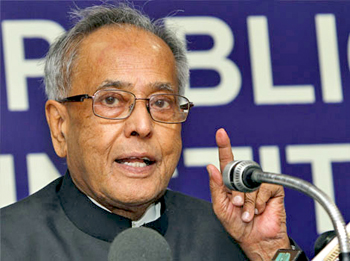New Delhi, Jan 11: President Pranab Mukherjee on Saturday asked the governors to be vigilant against efforts to disturb peace and tranquility in the country.
Alluding to incidents that have led to tension, Mukherjee reminded the governors that they were the first citizens of their states and they draw their authority from the Constitution and are oath-bound to protect, preserve and defend the Constitution and work for the welfare of the people of the state.
He conveyed his message through video conferencing that linked the Rashtrapati Bhavan with all governors in Raj Bhavans in the state capitals.
Mukherjee said India’s secular, democratic fabric is guaranteed by the Constitution. "The Preamble proclaims securing to all its citizens ‘liberty of thought, expression, belief, faith and worship’. They are further guaranteed by Articles 19 to 28 of the Constitution."
Mukherjee said the Constitution respects all religions. "We have to be ever vigilant against all efforts to disturb peace and tranquility. Celebration of plurality, promotion of tolerance and understanding among all sections of the society must guide action in the discharge of Constitutional duties."
The President said the governors also had the responsibility to play an active part in the development of tribal-dominated Fifth and Sixth Scheduled areas of the country. The scourge of Left-Wing Extremism should be tackled through the twin-pronged strategy of development and deterrence.
"For those who are governors and Lt governors in states and Union territories having international borders, another major issue is security in the border areas," he said.
Mukherjee said: “We cannot afford the luxury of being complacent on our borders. Repeated violations of the ceasefire on the Line of Control and recent incidents of incursions off our coastal line are a matter of serious concern. We should be ready to take all steps necessary to ensure both internal and external security, and protect territorial integrity of our nation."







Comments
Add new comment